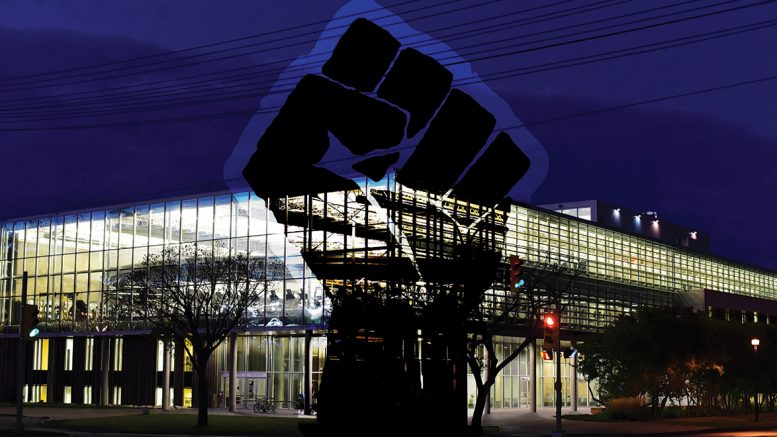The latest controversial suggestion arising from the more progressive elements of our campus has come in the form of a proposal for exclusive gym hours for women and non-binary individuals at the Active Living Centre (ALC). The argument is essentially that women and non-binary individuals may feel uncomfortable using the space for fear of harassment and therefore should have the option of exclusive times. Since then, there has been a predictable outcry on social media from gym junkies and couch potatoes alike who fervently believe that this is an attack against men.
This is an interesting debate to me, because I go to the University of Manitoba gym five to six times per week and have had nothing but positive experiences. There are friendly, well-trained staff of all genders and I have never witnessed any harassment. By my account, going to the ALC is a great social experience.
The thing is, we cannot make policies based on my experience. Or anyone else’s individual experiences for that matter. Rules in society are not formed through your anecdotal testimony, which serves as a powerful cognitive bias on your views. While my time at the gym has been positive, someone else’s may not have been. This becomes a problem if the people who feel like they are not able to access that same positive experience are disproportionately women and non-binary individuals. That’s called inequality, and it’s not up to you or I to say whether or not their opinions are valid.
We should all be thoughtful and compassionate enough to realize that not everyone has the same life experiences that we do. If you do not feel like ‘safe spaces’ are a good idea and that the world is not a dangerous place, that’s great – it means you may not have felt the same level of harassment, intimidation, or danger that others may have. Women and non-binary people are not biologically predisposed to feeling harassed or threatened. This is learned through a society where they are paid less than men, occupy relatively fewer positions of authority, and are disproportionately on the receiving end of physical and emotional violence, among other things.
While most of us do not leer, hover, touch, comment about, or harass other people, it still occurs.
Do all men harass? No. Do all women feel harassed? No. But following this line of reasoning relies on anecdotes and does not reflect the social reality and double standards that women face; it is a fact that one out of four women will be sexually harassed in their lifetime. In our society, this type of harassment is perpetrated disproportionately by one gender. Hint: it’s not women.
Even if you are not worried about harassment per se, gyms can still be intimidating. Your body is literally on display for everyone to see. For women and non-binary individuals, people who have faced harassment and safety threats, it is not unreasonable to believe that they may simply choose to steer clear of the facility altogether. This is the key implicit argument behind the reserved gym time proposal. It’s argued that discrimination is already taking place, even if it is not immediately obvious. Many women and non-binary people may feel like they cannot use the ALC given that gyms are typically hyper-masculine environments.
To illustrate this point, consider the pay inequity that women face in the workplace. You will never see a written rule that says women should be paid less than men for the same work, but it happens all the time. This type of injustice requires us to read between the lines; it is different, but no less real than formal discrimination.
That is why it is completely erroneous to say that this proposal is sexist or segregationist. A policy that is aimed at making marginalized groups feel safe and comfortable in relation to your more dominant group does not count as discrimination. Yes, there are obviously no rules that clearly prevent these individuals from participating, but that does not make the discrimination less real. So consider this – if you are upset that you may be restricted from coming to the gym for a few hours per week, how do you think some women and non-binary people feel that they cannot use the gym at all? It deserves acknowledgement simply because that is how many people feel.
This proposal speaks to larger social issues but it is even more important within the context of the Active Living Centre. Contrary to the arguments I have seen on social media, the U of M and its gym are not public spaces. It is a workplace, subject to the university’s Respectful Work and Learning Environment policy. Every student pays a gym fee to be able to access that space equally, so this is not the same as if you feel harassed at a park.
It is important to note that no one actually knows the extent to which there is demand for this idea or not. No one, to the best of my knowledge, has taken a statistically relevant sampling of the student population that ascertains whether or not women and non-binary people do in fact feel disproportionately intimidated or threatened by the environment at the ALC. This should be the first step in the process.
Right now, we have no idea what true public opinion on this issue is. If you look online, this proposal seems pretty unpopular. Although, perhaps that speaks to the issue itself. Maybe the people who are not speaking out are the same ones who hear a sexist comment and think less of the individual saying it, without feeling the need to vocalize their thoughts. At this point, all that has occurred is a significant amount of recoil from those who already feel empowered to speak out publicly.
In the meantime, my hope is that we try and listen to others rather than immediately turning a cold shoulder. If people are telling you that they are fearful, if people are telling you that they’re not comfortable, if people are telling you that they would have an improved quality of life if a policy was changed, perhaps entertain the idea that this is not being suggested to make your life worse but instead to make things more equitable and fair for everyone.
Is this suggestion really that much of a burden? Are your rights so infringed that you cannot sacrifice a few hours a week to people who are telling you that they feel physically threatened? If people are telling us that they feel unsafe, we need to listen.





